Forum
Just like with the Carpenters, Foreigner's CSPC is in preparation and kinda well advanced. What are you expecting from them?
By the way, a couple of observations on their data:
- the UK silver cert (60,000 sales) for their last studio album Can't Slow Down is a purely technical error from the BPI/OCC.
- their 1991 studio album Unusual Heat scanned 139,000 units as of 1998.
- '4' did sell roughly a million units through music clubs in the US although its certification remains unchanged since 1991.
I expect them at around 75M EAS worldwide.
Looking forward to this one!
I expect their first 5 albums to show very strong steady results. Unlike rivals Journey and Boston they dont have one gigantic album (Escape/Boston). "4" should be their biggest album, even though "I Wanna Know What Love is" from "Agent Provocateur" is their biggest hit.
Importantly "Records", their biggest compilation album, predates "I Wanna Know..."
Those first 5 albums alone are maybe responsible for 60M+ EAS. And Inside Information still did fairly good, but since then new materiel did next to nothing.
Grand total around 70M EAS perhaps?
I'm with everyone in that their final total will likely fall in the 70-75m range (I lean more on 75m), and that 4 should be their biggest album.
Their case is kinda like the Eagles in which they released a massive-selling comp right before releasing the album containing their most successful song. In Foreigner's case, however, they didn't have many comps released afterward that exploited their biggest song, thus I think Agent Provocateur will end up with lower EAS, perhaps even lower than their self-titled debut?
I'm also interested to see how they fare globally. At first glance, they seem like a US-centric act based on their certs, but they seem to have a decent following in Canada, Japan, and Germany, plus they seem to have gotten more global after 4, although that didn't last too long before they underperformed with Inside Information.
Journey is at 84.7M EAS
Boston is at 51.3M EAS
Surely Foreigner must be somewhere in between.
Gui, I would like to know your guestimates for the other late 70s/80s AOR greats: Toto, Styx, REO Speedwagon and Survivor. Styx and REO looks bigger in America, but TOTO had the bigger singles and might be bigger worldwide. Survivor gotta be the smallest one in spite of their monster hit Eye of the Tiger.
My subjective estimates for both groups are as follows:
The Carpenters - 65M EAS
Foreigner - 75M EAS
I looking forward to data on Foreigner. Carpenters are great too!
@featured9318 I'd say they started as a Hard Rock band, inspired by Led Zeppelin. Folk Rock too - like Zeppelin. But their 80s comeback albums are definately AOR. So 80s AOR Greats for sure. The numbers speak for themselves. But when Heart scored big in 1985, the bands I listed were more or less all past their prime. That's probably why I didn't think to list them.
But who's AOR and who's not? Journey and Foreigner are probably the quintessential AOR bands, but what about a guy like Bryan Adams? Isn't "Reckless" one of the greatest AOR albums ever? Did Genesis go AOR in the 80s? Tina Turner? Springsteen? And Bon Jovi? Were they Heavy Metal, Hair Metal, Hard Rock in the 80s, or is Slippery When Wet simply the biggest, greatest AOR album of all time?
AOR reigned from 1984 to the end of 1989. The other acts like pat benatar and cher were stylised towards AOR during those years. Also the acts that you stated. It was AOR overload, which i love.
@featured9318 I'd say 1976-1986 was the golden years of AOR
Foreigner's commercial peak was 1977-1984
Styx 1977-1983
Journey 1978-1986
Toto 1978-1982
Reo Speedwagon 1978-1984
Boston's 1976-1986
Survivor 1982-1985
Am I the one who feels like Foreigner were Aerosmith in disguise? They got big when Aerosmith started to vanish, and vice versa! Together they were hot for 25 years 😀
@mjd Lol, that's a new one! But the most common example I heard of is Adele and Sam Smith, because they always release albums right after one another after 2011.
Formed in 1976 by seasoned musicians from both sides of the Atlantic, Foreigner quickly established itself as one of the defining rock bands of the late 1970s and early 1980s. Founded by former Spooky Tooth guitarist Mick Jones, alongside ex-King Crimson multi-instrumentalist Ian McDonald and American vocalist Lou Gramm, the band combined British craftsmanship with American rock sensibilities. Their self-titled debut album, released in 1977, became an instant success, featuring hits like Feels Like the First Time and Cold as Ice.
Up to mid-1980s, Foreigner dominated the charts with multi-platinum albums, producing classic rock staples such as Hot Blooded, Urgent, and the global hit I Want to Know What Love Is. However, the band also faced internal tensions, lineup changes, and shifts in musical trends.
This article explores Foreigner’s commercial trajectory, highlighting their peak years, challenges, and lasting legacy in the rock music industry.
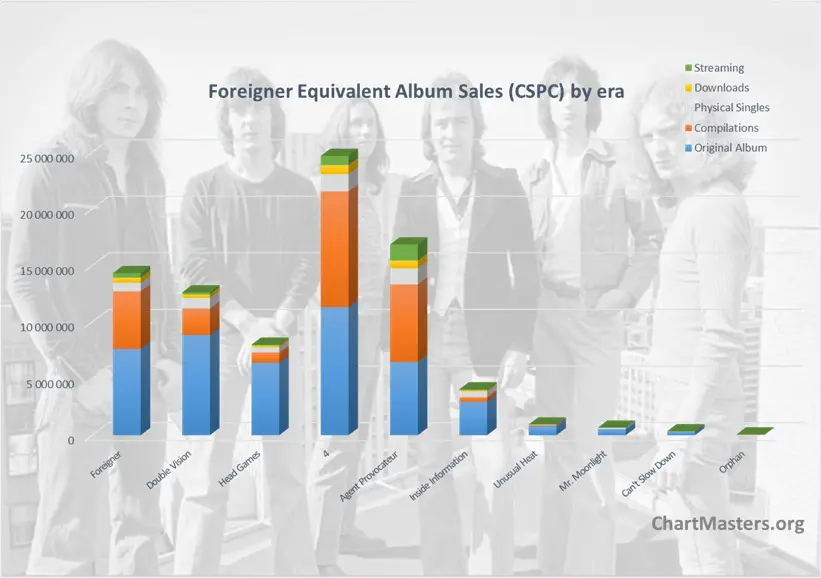
Looking at the big picture: Foreigner
Formation and early years (1976-1977)
In 1976, British guitarist Mick Jones, formerly of Spooky Tooth, sought to form a new rock band that blended British and American influences. After moving to New York City, he connected with former King Crimson multi-instrumentalist Ian McDonald and drummer Dennis Elliott. To bring in an American perspective, they recruited Lou Gramm, a powerful vocalist from Rochester, New York, along with bassist Ed Gagliardi and keyboardist Al Greenwood. The band's lineup was finalized, and they named themselves Foreigner, reflecting the international nature of their members.
Foreigner's self-titled debut album, released in March 1977 under Atlantic Records, became an immediate success. Propelled by hit singles like Feels Like the First Time, Cold as Ice, and Long, Long Way from Home, the album reached #4 on the Billboard 200 and started their run of multi-platinum albums in the US. Their polished rock sound, combining melodic hooks with hard rock energy, made them one of the most promising new bands of the era.
Breakthrough and chart domination (1978-1981)
Following the success of their debut, Foreigner released Double Vision in June 1978. The album continued their commercial momentum, peaking at #3 in the US despite the competition of albums like Grease, Boston's Don't Look Back and Billy Joel's 52nd Street. It featured radio staples like Hot Blooded, Blue Morning, Blue Day, and the title track Double Vision, solidifying their status as arena rock superstars.
However, internal tensions began to emerge, particularly between Mick Jones and Lou Gramm, as Jones sought greater creative control. These tensions became more apparent during the making of Head Games (1979). The album adopted a grittier, more aggressive sound, featuring tracks like Dirty White Boy and Head Games, but the band faced challenges with shifting dynamics. The album still performed well commercially, reaching #5 on the Billboard 200.
Foreigner’s biggest breakthrough came in 1981 with 4, a pivotal album in their career. By this time, Ian McDonald and Al Greenwood had been dismissed from the band, reducing Foreigner to a quartet. This move allowed Mick Jones to refine their sound further, incorporating elements of synthesizers and a more polished production, orchestrated by legendary producer Mutt Lange. The era spawned hits such as Urgent (featuring Junior Walker’s saxophone solo), Juke Box Hero, and Waiting for a Girl Like You, which spent a record-setting 10 weeks at #2 on the Billboard Hot 100. The album was a massive success, topping the Billboard 200 for 12 weeks spread over a six months span. The band's popularity also extended with 4 reaching #5 in the UK and #4 in Germany.
Global stardom and power ballad success (1982-1985)
After the triumph of 4, Foreigner took a short break before returning with Agent Provocateur in 1984. This album saw the band embracing a cleaner, radio-friendly sound, in line with the evolving music industry of the mid-1980s. It featured the global hit I Want to Know What Love Is, a power ballad that became their first and only #1 single on the Billboard Hot 100. The song also topped charts worldwide, including in the UK, Canada, and Australia, and remains one of the most iconic rock ballads of all time.
Despite continued commercial success, tensions between Mick Jones and Lou Gramm escalated. Gramm, favoring a harder rock approach, often clashed with Jones’ growing interest in polished, synthesizer-heavy production. These creative differences would soon lead to significant changes within the band.
Decline and lineup instability (1986-1993)
By 1987, the friction between Mick Jones and Lou Gramm had reached a breaking point. While working on Inside Information, their next album, the two often found themselves at odds. Despite this, the album performed well, reaching platinum status and producing hits like Say You Will and I Don’t Want to Live Without You. However, the cracks in the band were becoming too apparent to ignore.
In 1990, Lou Gramm officially left Foreigner to pursue a solo career, frustrated with the band’s musical direction. Johnny Edwards was brought in as his replacement, and Foreigner released Unusual Heat (1991). The album, however, failed to capture the public’s interest, becoming the band’s lowest-charting release - a dreadful #117 peak position - and marking a significant downturn in their commercial fortunes. Recognizing the decline, Mick Jones and Lou Gramm reconciled, leading to Gramm’s return in 1992. They released The Very Best... and Beyond (1992), a greatest hits compilation with a few new tracks, but the band’s ability to dominate the charts had faded.
Reunions and legacy (1994-Present)
In 1994, Foreigner released Mr. Moonlight, an attempt to reclaim their former glory. The album featured Until the End of Time, which achieved moderate success on adult contemporary radio but failed to bring the band back to its previous commercial heights. By the late 1990s, Foreigner had largely shifted into a legacy act, focusing on live performances rather than new studio material.
In 2003, Lou Gramm left the band permanently due to health issues and personal differences. Foreigner underwent yet another transformation when Mick Jones recruited Kelly Hansen as the new lead vocalist in 2005. With Hansen, the band revitalized its live presence, frequently touring and performing their classic hits to audiences worldwide.
Although Foreigner has not released a studio album since Can’t Slow Down (2009), they remain a major touring force. Mick Jones, the last remaining original member, has continued to guide the band, ensuring that their music remains relevant to new generations of rock fans.
Their enduring impact is evident in their continued presence on classic rock radio, the licensing of their songs in films and television, and their influence on later rock bands. Despite changes in lineup and musical trends, Foreigner’s legacy as one of the most successful rock bands of the late 20th century remains strong.
Foreigner album sales

Updated studio album sales & comments
Selling over 5 million copies in the US alone with each of their first four albums was no small feat, highlighting Foreigner's huge success in this market, even if their international sales were weaker in their early years. Among their 1970s releases, Double Vision stands as their top seller, nearing 9 million copies.
With 4, they became a global powerhouse, propelling the album past the 10-million mark - it has now reached 11 million sales. Agent Provocateur, home to their biggest single, didn’t have the lasting impact of its predecessor but still extended their streak of 6-million sellers.
Inside Information was comparatively weaker but remained solid at 3 million. However, lineup changes took a toll on their momentum, and their post-1980s albums have since averaged just 550,000 sales each.
In total, Foreigner's nine studio albums have sold a combined 45 million copies.
Want to compare the act's albums with others?
Foreigner songs sales
Below, we list down results from the artist through physical sales, digital sales and streaming.
Please be aware that when the artist is regarded as the lead act, they are rewarded with 100% of these units. However, featured acts share a 50% piece of the total.
Physical singles
I Want to Know What Love Is leads the way as Foreigner's best-selling physical single. The global chart-topper has sold nearly 4 million copies - an impressive figure by 1980s standards.
Urgent (US #4) and Waiting for a Girl Like You (US #2), both from 4, are nearly tied at 2 million copies worldwide. The former includes its catalog reissue, which happened to feature the latter as the B-side.
Other major hits include Cold as Ice (US #6) from their debut album, as well as Hot Blooded (US #3) and Double Vision (US #2) from their sophomore effort, all of which are in the 1.3 million range.
Their debut single, Feels Like the First Time, was also a US top 10 hit (#4) but fell just short of the million mark. The same goes for Say You Will (#6) and I Don't Want to Live Without You (#5) from Inside Information. Juke Box Hero charted significantly lower (US #26), but thanks to decent performances elsewhere, it matched these songs' sales at 800,000 copies.
For a band whose main strength lay in album sales, Foreigner still achieved an impressive total of 19 million physical singles sold.
Digital songs
The global anthem I Want to Know What Love Is unsurprisingly dominates Foreigner's best-selling downloads and ringtones. The enduring 1980s classic has accumulated 4 million digital sales.
A bigger surprise comes with Juke Box Hero, the runner-up with over 2 million sales. Despite being the second-lowest-charting US single among their first 12 releases, the song became a sleeper hit, evolving into a staple on classic rock radio in North America.
The top three is rounded out by Waiting for a Girl Like You, which has moved 1.8 million units. Other strong performers include Cold as Ice (1.4 million), Urgent (1.2 million), Hot Blooded (1.2 million), and Feels Like the First Time (1 million), all highlighting the lasting appeal of Foreigner's catalog.
Beyond this major top seven, sales drop below the half-million mark. Just under that threshold are former hits Double Vision, Head Games, and That Was Yesterday, which complete the band’s top 10.
Foreigner’s first six albums each featured 10 tracks - and together, these albums have amassed 16 million digital sales, averaging over 250,000 per song recorded!
Streaming
Audio Streams
– South Korea: Genie streams * 2.20 (consistent with Gaon streaming numbers)
– Japan: AWA streams * 100 / 4 (AWA has 4% of the Japanese streaming market)
– Arabic world: Anghami streams
– Sub-Saharan Africa: Boomplay + Audiomack streams
– Elsewhere: Spotify streams * Spotify market shares based on artists' market distribution
Video Streams
– China* : QQ video streams * 50 if the song is available for audio stream, QQ video streams * 5 elseway (scale built based on known figures for several major artists)
– Elsewhere : Youtube views increased by 10% to account for various local platforms
*since Chinese streaming platforms are mostly video streaming platforms, their streams are weighted on par with YouTube streams.
Audio Stream value – 1,500 plays equal 1 album unit
Video Stream value – 6,750 views equal 1 album unit
Equivalent Albums Sales (EAS) = ( Spotify * ArtistRatio + Genie * 2.20 + AWA * 100 / 4 + Anghami + Boomplay + Audiomack ) / 1500 + ( QQ views* 50(or 5) + YouTube * 1.1 ) / 6750
Top hits
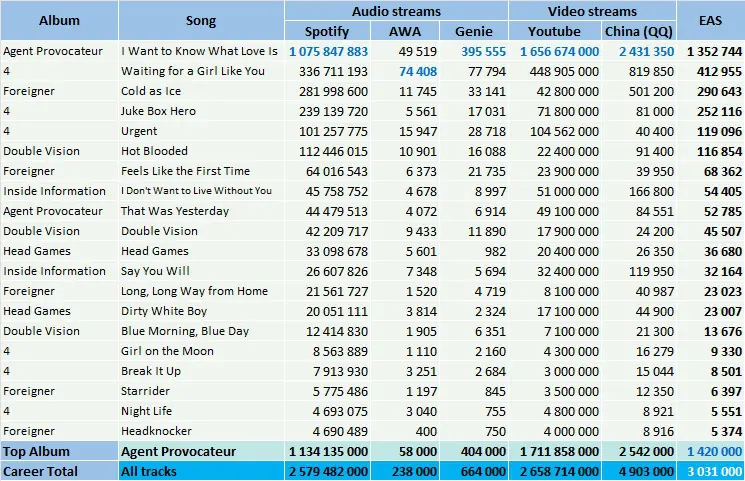
The streaming age has confirmed once again the fantastic popularity of I Want to Know What Love Is. Currently the 35th most streamed 1980s track, it has recently surpassed the billion mark on Spotify. On YouTube, it's even stronger at 1.6 billion. Overall the song accumulates 1.3 million equivalent album sales from streams.
With over 300 million on Spotify and 400 million on YouTube, Waiting for a Girl Like You is a strong runner up. It's the band's signature song in Japan, as shown by AWA's statistics. Cold As Ice is third thanks to its impressive showing on Spotify.
Juke Box Hero ranks at #4, slightly below its digital sales ranking due to the smoother influence of North America on streaming data. Urgent has topped 100 million on both Spotify and YouTube, while Hot Blooded did it on the former platform.
If tracks from 4 rank higher in general, Agent Provocateur has the highest album total thanks to overwhelming total of I Want to Know What Love Is.
The streaming era has once again confirmed the fantastic popularity of I Want to Know What Love Is. Now the 35th most-streamed track from the 1980s, it recently surpassed 1 billion plays on Spotify. On YouTube, its presence is even stronger, with 1.6 billion views. Altogether, the song has generated the equivalent of 1.3 million album sales from streams.
With over 300 million streams on Spotify and 400 million views on YouTube, Waiting for a Girl Like You is a solid runner-up. It stands as Foreigner's signature song in Japan, as reflected in AWA’s streaming statistics. Cold as Ice follows in third place, driven by its impressive performance on Spotify.
Juke Box Hero ranks fourth, slightly lower than in digital sales due to North America's smaller influence on streaming global scores. Meanwhile, Urgent has topped 100 million streams on both Spotify and YouTube, and Hot Blooded has crossed that milestone on Spotify.
While tracks from 4 generally rank higher, Agent Provocateur claims the highest overall album total, thanks to the overwhelming dominance of I Want to Know What Love Is.
Full catalog breakdown
If you are familiar with the artist's catalog and want to check details of each and every song, you can access to all of them right here.
Keep yourself up to date
Our website provides you a fantastic tool which fetches updated Spotify streams as you request them, use it to watch these results grow day after day!
Foreigner compilations sales
Assigning compilation sales to original studio albums

How do you understand this table? For example, if we check the Records line, these figures mean it sold 10,440,000 units worldwide. The second statistics column means all versions of all the songs included in this package add for 1,388,244 equivalent album sales from streams across all formats.
The second part (on the right of the table) shows how many equivalent streams are coming from each original album, plus the share it represents in the overall package.
Therefore, the streaming figures convey that songs from 4 equate to 56% of Records' tracklist attractiveness. Meaning, it generated 5,897,000 of its 10,440,000 album sales and so on for the other records.
Raw compilations sales
Foreigner's original discography is remarkably streamlined - nine studio albums containing a total of 95 tracks, with very few releases outside these core records. By the end of the 1980s, only one compilation or live album had emerged: Records (1982). Even the massive success of I Want to Know What Love Is didn’t trigger a flood of greatest hits collections.
This uncluttered catalog allowed Records to climb all the way to 10 million sales. Their next global compilation wouldn’t arrive until a decade later. In 1992, The Very Best of Foreigner was released, primarily in Europe, selling 800,000 copies. A few months later, The Very Best... and Beyond received a worldwide release, becoming their flagship compilation for several years and reaching 4 million sales.
Foreigner’s first live album, Classic Hits Live (1993), sold 635,000 copies. In the 2000s - when the wave of compilations slowed for most artists - Foreigner’s catalog found new momentum. Releases like Foreigner Anthology: Jukebox Heroes (375,000), The Definitive (660,000), Complete Greatest Hits (1.37 million, North America only), Hot Blooded and Other Hits (545,000, North America only), Live in ’05 (425,000), The Definitive Collection (250,000), and No End in Sight (825,000) racked up significant sales, repeatedly repackaging the same tracks.
Then, iTunes and streaming largely killed the compilation era... except for Foreigner. The 2010s saw a steady flow of new releases, including Can’t Slow Down... When It’s Live (410,000), Foreigner Anthology: Jukebox Heroes (125,000), Acoustique (265,000), Juke Box Heroes (650,000, North America only), The Best of Foreigner 4 & More (290,000), Playlist (315,000, North America only), 40 (240,000), and Foreigner with the 21st Century Symphony Orchestra & Chorus (135,000), among others. The fact that these compilations continued to perform well despite competing against each other is remarkable.
Unsurprisingly, this wave of releases cannibalized the catalog sales of their studio albums, except when bundled into box sets. Original Album Series (100,000 copies, covering their first five albums) and The Complete Atlantic Studio Albums (85,000 copies, covering their first seven albums) managed to carve out a niche in the market.
Re-assigned compilation sales – Results & comments
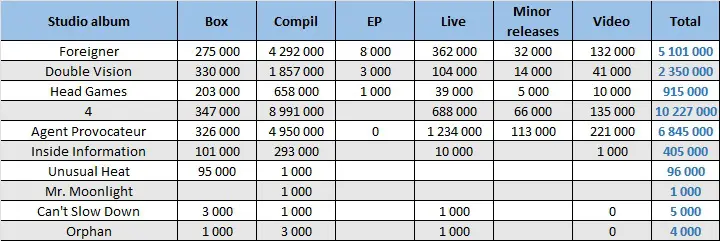
Hits-packed 4 was the key driver behind Records’ massive sales, as well as numerous later compilations, bringing its total past 10 million. Agent Provocateur only began influencing compilation sales in 1992, but it has done so impressively ever since, contributing to 7 million sales.
Following behind are Foreigner at 5 million, Double Vision at 2 million, and Head Games just shy of the million mark.
Bonus: Top selling compilations' breakdowns
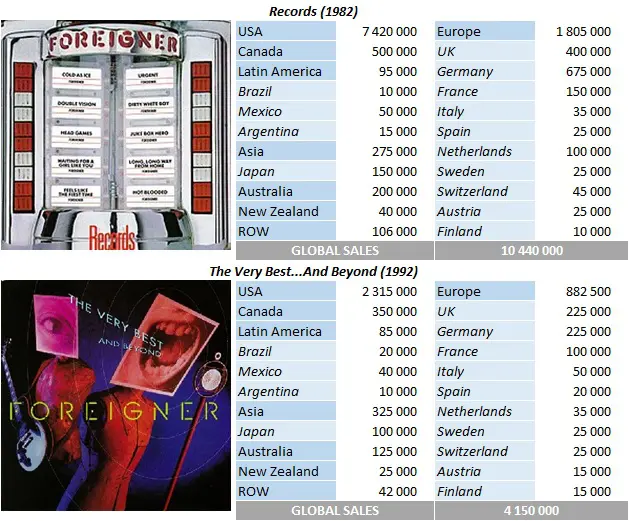
Bonus: Total album (all types) sales per country
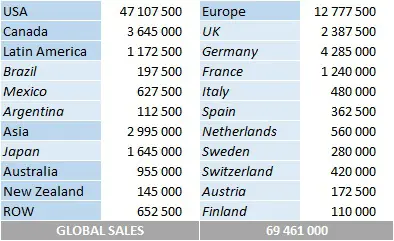
Please note country-specific numbers may miss sales of a few minor releases, although totals are complete.
Foreigner: career results (CSPC)

Albums results (CSPC)
In the following results table, all categories display figures in equivalent album sales. If different, pure sales are listed between parentheses.
As a reminder:
- Studio Album: sales of the original album
- Other Releases: sales of compilations generated thanks to the album
- Physical Singles: sales of physical singles from the album (ratio 3/10)
- Download Singles: sales of digital singles from the album (ratio 1,5/10)
- Streaming: equivalent album sales of all the album tracks (ratio 1/1500 for Audio stream and 1/6750 for Video stream)
Artist career totals
See where the artist ranks among remaining singers
Foreigner are one of those rare artists whose biggest album doesn’t feature their biggest song. 4 comfortably outpaces Agent Provocateur, with massive sales of 25 million and 17 million, respectively.
Their self-titled debut stands at 14 million, while Double Vision completes an extraordinary top four with 12.6 million. Head Games follows at a solid 8 million.
Inside Information adds a respectable 4 million, but Unusual Heat (940,000), Mr. Moonlight (660,000), and Can’t Slow Down (350,000) fall far behind and are largely forgotten today.
With a career total of 82 million, Foreigner firmly rank among the biggest rock bands of their era.
Singles results (CSPC)
Want to compare the act's songs with other top hits?
Discography results (ASR)
Thanks to our new ASR (Artist Success Rating) concept, we know that sales represent 0.00 million times the purchase of entire discography. Coupled with total sales, it translates into an ASR score of . The ranking of all artists studied so far is available too at this link.
Records & achievements
- At 24,679,000 EAS, 4 is the 3rd most successful album from 1981.
- At 14,323,000 EAS, Foreigner is among the 20 most successful album from 1977.
- At 12,621,000 EAS, Double Vision is among the 20 most successful album from 1978.
- At 16,847,000 EAS, Agent Provocateur is among the 20 most successful album from 1984.
- I Want To Know What Love Is is one of the rare 1980s songs over 1 billion plays on both Spotify and YouTube
- At 10 weeks, Waiting For a Girl Like You has the longest run at #2 on Billboard's Hot 100 without ever hitting #1
Dynamic Spotify key performance indicators
Current followers count: 0 >> Daily breakdown
Current streams count: 0 >> Daily breakdown
is #0 among the most streamed artists of all-time Popularity Rating: /100 >> Visit our Top 1,000 most streamed artists ranking >> Visit our Top 20 highest rated artists ranking
Current monthly listeners: 0 (Trend: 0) Global chart position: N/A The artist top 50 cities come from 0 distinct countries >> Global impact breakdown
As usual, feel free to comment and / or ask a question!
Sources: IFPI, Spotify, YouTube, Discogs, Billboard.
You may be interested in...
... Foreigner' streaming masters analysis
... checking out the upcoming artists or even voting for them!
... similar artists
... best-selling artists, albums, and singles
Vow! 82M is more than I expected! That's pretty close to Journey's 85M. Impressive! They might even have been ahead of Journey prior to Don't Stop Believin's "2nd life".
Thanks a lot Gui. Great job as always.
One question. When some compilations are regional only (like complete gh) Do you take into account which songs are popular in that region, or do you still use the WW EAS to determine which songs generated sales of the compilation (you mentioned Juke Box Hero was particularly popular in North America).
Foreigners' total is indeed better than expected, primarily due to their compilation sales. I predicted 75m for them, but their first 5 albums easily cleared that mark. Plus, Inside Information isn't the commercial decline I thought it was with a solid 4m EAS. The only negative thing is the albums that followed, as they seemed to become a legacy act (commercially-speaking) overnight quickly.
Another thing to point out is their relatively low streams outside their big hits, with most of their album cuts not doing good numbers. This phenomenon is further seen from their singles EAS, with their Top 10 songs accounting for 70.7m EAS, which is 85% of their total EAS, 90% if we extend it to their Top 12 songs. It seems that their current popularity is concentrated on a bunch of songs, which may explain why their GH over the last 2 decades so well, as the hits are truly worthy, but this is also at the cost of not giving their album cuts more exposure.
Another thing to point out is their relatively low streams outside their big hits, with most of their album cuts not doing good numbers. This phenomenon is further seen from their singles EAS, with their Top 10 songs accounting for 70.7m EAS, which is 85% of their total EAS, 90% if we extend it to their Top 12 songs. It seems that their current popularity is concentrated on a bunch of songs, which may explain why their GH over the last 2 decades so well, as the hits are truly worthy, but this is also at the cost of not giving their album cuts more exposure.
I see your point, but it's not that unheard of. The top 8 (EIGHT!) Boston songs account for 81% of their total EAS. Then again, they released just 6 albums, and only 3 of them went big. But the Police released 5 albums - all big hit albums. And their top 10 songs account for almost 88% of their total EAS (top 12 songs more than 90%). Journey released 15 albums (compared to Foreigner's 9) and their percentages aren't that far behind either. Top 10 songs 81%, top 12 songs 84%. Meat Loaf released 12 albums - top 10 songs account for more than 85%.
Btw Meat Loaf is also one of those rare occations where his biggest song (I'd Do Anything for Love) is not on his biggest album, like Foreigner (I Wanna Know What Love is).
Vow! 82M is more than I expected! That's pretty close to Journey's 85M. Impressive! They might even have been ahead of Journey prior to Don't Stop Believin's "2nd life".
Thanks a lot Gui. Great job as always.
One question. When some compilations are regional only (like complete gh) Do you take into account which songs are popular in that region, or do you still use the WW EAS to determine which songs generated sales of the compilation (you mentioned Juke Box Hero was particularly popular in North America).
Yes, we still use global data! Often, local releases are balanced globally (like Foreigner in 1992) with two compilations released, one mostly for North America, the other for Europe, as the big hits in both places are not exactly the same ones. For a song like Juke Box Hero, its influence is likely understated on US releases, but also overstated on global releases.
Yes, we still use global data! Often, local releases are balanced globally (like Foreigner in 1992) with two compilations released, one mostly for North America, the other for Europe, as the big hits in both places are not exactly the same ones. For a song like Juke Box Hero, its influence is likely understated on US releases, but also overstated on global releases.
Thanks!
















































